If you think about keeping a guinea pig, you must be informed about their essentials – bedding, food, toys, and more. However, there is another adorable thing to know about guinea pigs, and that is the sounds they make.
Guinea pigs can purr. The sounds they produce can even resemble the purr of a cat. Guinea pigs make different types of purrs that signal how they feel at that exact moment. They make many other sounds and each distinct sound signifies different things – mood, hunger, fear, and other emotions.
Table of Content
Different Types of Guinea Pig Purring
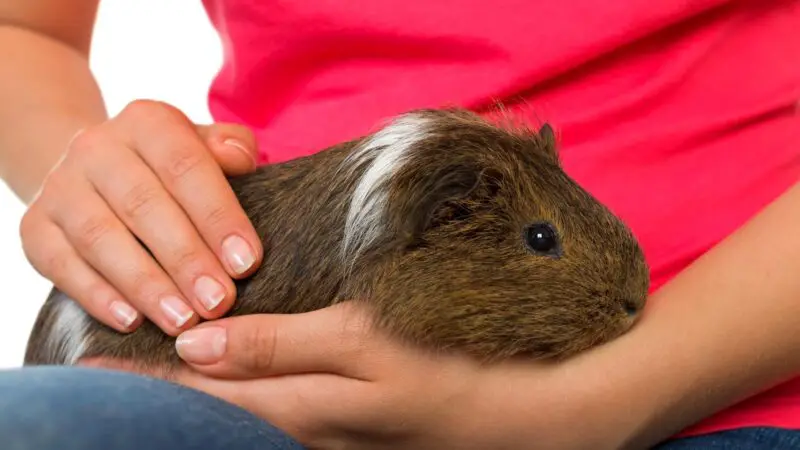
You’ll surely be surprised that the guinea pig purr can be interpreted in different ways.
- A soft, slow, and deep purr means the guinea pig is relaxed, satisfied, or content.
- A purr of high-pitch and sharp sound means the guinea pig is dissatisfied with something or even annoyed. It might even sound like whining because it lacks something (food or water), or it needs clean bedding or is dissatisfied by the other guinea pig.
- The purr that is quite short and in intervals is an alarming sound. If it is scared, this sound will either be short and high-pitched squeaking or a loud and short shriek. So pay attention to the surrounding of the guinea pig and why it would be scared.
Other Sounds That Guinea Pigs Make
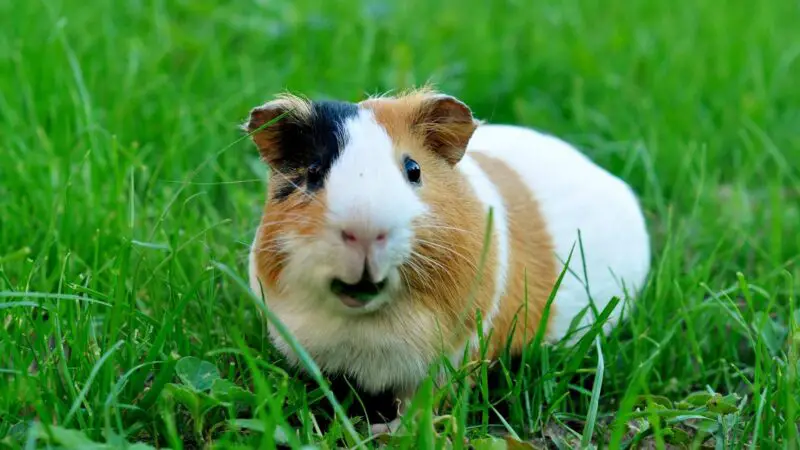
First of all, let’s not forget that guinea pigs are highly sociable creatures. They will try to communicate with you using both their body language and sounds. The sounds they make signify different things that your pet is trying to tell you.
Whistling
Sometimes, you will hear your guinea pig make sounds that resemble whistling. This sound is like a squeal or a high-pitched whistling. Whenever you notice this, know that the guinea pig is either happy or excited and thrilled about something. Usually, this is enthusiasm for playtime or feeding time.
Also in some cases, this sound can be heard if the baby guinea pig is being split from the mother pig. This is then the total opposite of happiness.
Cooing
Sometimes, if a guinea pig had pups, it will make a sound like cooing. This is normal and you will recognize it instantly because it sounds warming, mother-like caring.
Hissing
Sometimes, these rodents hiss. This is another sound resembling noises that cats make. This one is strangely executed because you might think it is teeth-chattering mixed with a hiss.
Also, guinea pig is hissing because they are very aggressive and angry. It might be angry at you if you nag it for petting, or it might be angry at the other guinea pig.
Chirping
One of the rarely pleasant sounds guinea pigs make is chirping. This sound is mesmerizingly calming and cute, but it might be a signal of sadness or deep feelings.
Guinea pigs have feelings and emotions because they are very sociable. When you hear this sound, just know your furry pet needs extra love.
Some describe this behavior as a trance state of mind, but it is most likely brooding and grieving after the guinea pig has lost its partner.
Related: Why Do Guinea Pigs Wheek?
Which Sounds Signal That My Guinea Pig Needs Me?
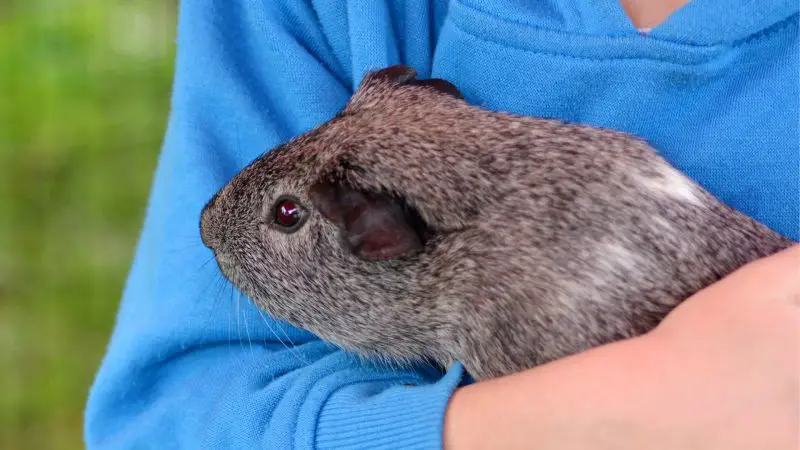
What your guinea pig needs is not always obvious, so pay close attention.
If the cavy whistles, it is obviously inviting you to play with it. So feel free to go ahead, hold it, pet it, or engage it in fun activities. This is the guinea pig’s best mood, so you can even lay down with it on the sofa or your bed and cuddle next to it.
When the guinea pig makes high-pitch purrs or shrieks, ensure it is not frightened of something. If these sounds continue, do not force yourself to pet it. Simply add food or water to its cage if needed, and leave it alone to rest and calm down.
If you hear or sense the guinea pig is chirping or making ‘chirpy-vibrating’ sounds, it is very sad. Gently approach it in case it ‘cries’ over its lost partner or simply if it’s depressed from solitude.
It maybe wants to be petted or simply held calmly in your arms. If not, just play safe with the food and water option, and think of getting him a new friend for its cage!
How to Recognize If My Guinea Pig Wants to Be Left Alone or Helped?
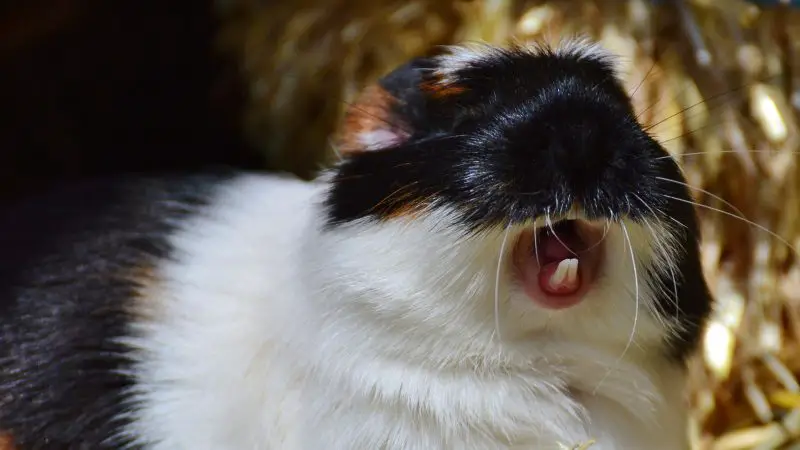
You have to recognize the right sounds of your guinea pig. The hissing sounds signal a ‘do not approach’ attitude, so it is best to leave it alone and don’t pet it. If you try to approach it at this time, you might get bitten, which is logical.
If you really want to help your little pet friend, just put some healthy snacks or food in its cage and do not nag it. Once rested or fed, the guinea pig will be in a good mood again.
In case the two guinea pigs fight and one or both of them make unpleasant sounds like teeth chattering, shrieks, or hisses, try to remove one of the guinea pigs from the cage gently while there is still no physical fight going on.
Protect your hand with a thick glove. Gently take out one of them and play with it on the floor or calm it down near you. After a while, slowly reintroduce them together again, and distract them with food or healthy snacks.
Related: What Do Guinea Pigs Noises Mean? | Sounds Explained
The Connection Between Guinea Pig Sounds and Their Body Language
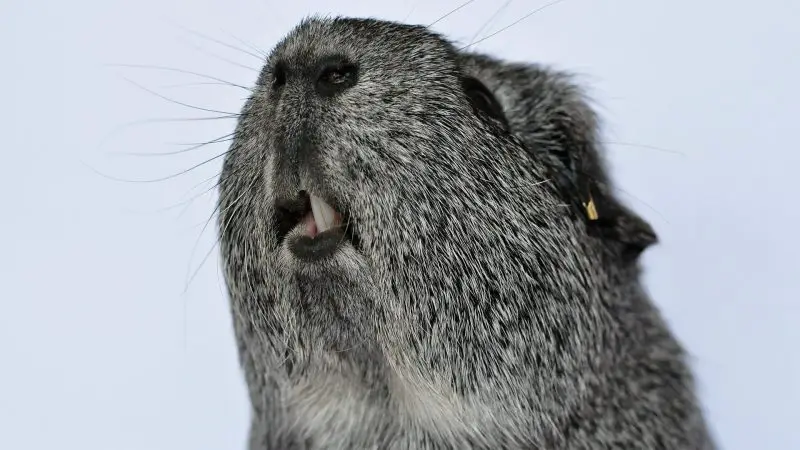
Very often, the guinea pigs will express certain body language movements when they make their sounds. Their non-verbal communication is just as strong and expressive as their language of sounds. They manifest body language with, or without the sounds mentioned.
During the purrs and whistles, for example, guinea pigs can express happiness and friendly behavior if they hop around the cage or floor, as if they are lightweight, and in a hurry to do something nice. It is cute, almost as if the guinea pig is a huge light popcorn that skips around. It may also rub its nose on you or on its cavy friend.
If your guinea pig is dissatisfied or angry, even anxious and unhappy at the same time, it will look frozen, head upward or fidgeting. At this point, if you approach it, it might make hissing sounds.
If the guinea pig makes chirping sounds that are quiet and almost completely silent, it is sad or depressed. These body movements and sounds are more like the guinea pig is static and ‘vibrating’ on its bedding.
Do Guinea Pigs Make Snoring Sounds When They Sleep?
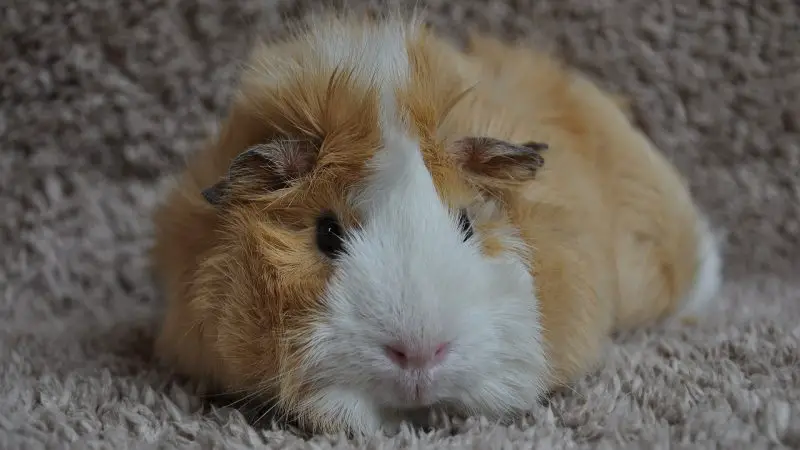
Guinea pigs might make sounds when they sleep, and quite often too! Do not be too alarmed because of this. It is normal for guinea pigs to make some sounds out when they are fully asleep.
If they seem to be snoring, this could be either plain, simple snoring, or respiratory obstruction in the upper part of the chest. If the snoring sounds too loud or persistent, it is a good idea to check this with a veterinarian. Especially if the snoring continues and the cavy’s eyes are crusty or running and its appetite has changed.
The guinea pigs can often get allergies, so their airways might swell and cause snoring sounds. At other times, the bedding can cause a reaction in the guinea pig. Thus, try changing the bedding type you used.
What Sounds Do Guinea Pigs Make When Sick or in Pain?
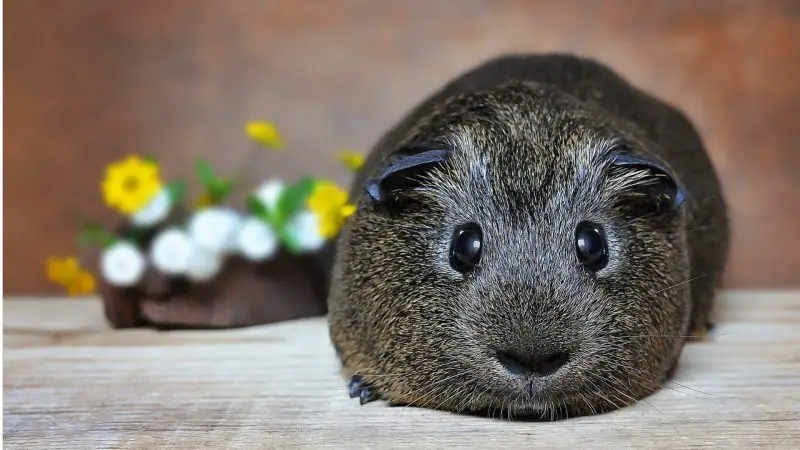
Go to the veterinarian immediately if your guinea pig makes wheezing sounds because something might be wrong with its breathing.
Also, if it is snoring strange and combined with physical symptoms, like crusty and runny eyes or nose, it also may be some illness worth checking with the vet.
When the guinea pig is in some pain or heavy discomfort due to sickness or physical pain, the sounds will resemble a ‘wet sponge/towel on glass’ like screeching. You will recognize it immediately and you’ll be able to help the guinea pig in no time.
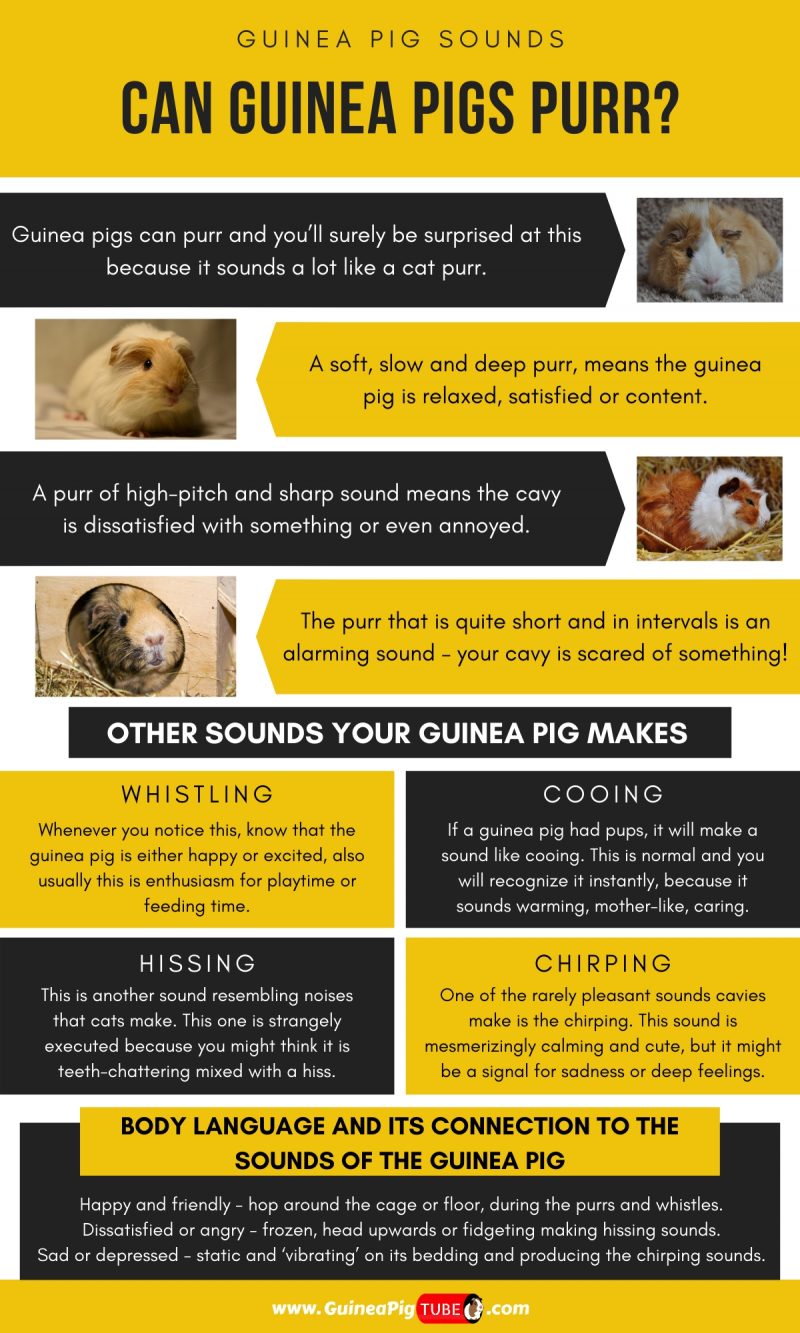
Summary
Learning to understand all of these sounds will help you know when your cute furry pet is in a good mood or needs you to help him. At first, it may seem almost impossible to differentiate these sounds. But with some time and practice, you will become a real expert when it comes to guinea pig language.
List of Sources
The Whistles of the Guinea Pig: An Evo-Devo Proposal
Representation of Species-Specific Vocalizations in the Medial Geniculate Body of the Guinea Pig
Cortical Representation of Species-Specific Vocalizations in Guinea Pig
Individual Differences in Infant Guinea Pig Pups Isolation Whistles
Guinea-Pig Vocalizations: Their Structure, Causation and Function
